Physiotherapy Outpatient Department
How we can help you
Our department can help those with pain or problems in their muscles and/or bones.
We do this by:
- finding out what the problem is when you come to your first appointment
- finding out from you your needs and concerns
- working with you to come up with a plan of how exercise can help you both in the short and long term
- providing education.
We offer both individual services as well as group based programs.
Manager
Head of Physiotherapy Department Daniel Treacy
Opening hours
8.00am - 4.30pm Monday to Friday.
We do not offer weekend treatments.
How to find us
You can find us on Level 1, High St Building, Prince of Wales Hospital (Building 2 on our campus map)
Information about how to get to our Randwick campus
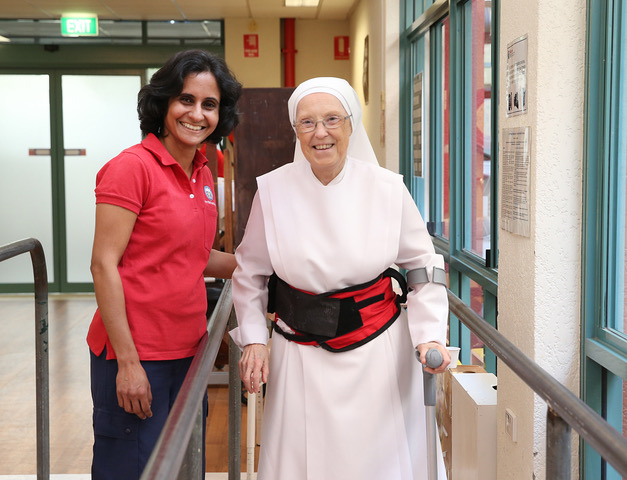
We care for people who experience pain or having problems with their bones and muscles caused by disease, trauma or overuse. We also support people as they recover from surgery.
Our team includes physiotherapists, allied health assistants and student physiotherapists who will be responsible for your assessment and physiotherapy treatment plan.
We work in partnership with medical and surgical specialists and your local doctor (GP).
Our administration officer can help you with bookings, referral management and telephone enquires.
At your first appointment we will ask about your medical history and your health needs. We will conduct a physical examination. We will then discuss what type of physiotherapy will benefit you. This can include combination of appointments at the hospital with a physiotherapist and a plan for you to follow at home. Physiotherapy treatments involve education, advice, exercise and manual therapy (hands on techniques).
You will need a referral letter from your local general practitioner (GP) or specialty doctor to use this service. Your doctor will need to submit this referral electronically via Healthlink. Your referral will include why you are being referred, your medical history and any relevant test results including imaging.
Once we receive this referral and accept it we will send you a letter with your appointment details. We will also send this to your doctor. If we cannot make an appointment for you, we will send you a letter confirming that you are on the waiting list for the next available appointment.
We aim to see our patients as quickly as possible. We prioritise appointments for patients who have an urgent need based on their condition. Urgent cases are generally given an appointment within 7 days of receiving the referral. Non-urgent conditions may need to go on a waiting list and may take up to 4 months to receive an appointment.
We will contact you when an appointment has become available.
We will call you from the hospital which will come up on your phone as a private number. If we cannot reach you, we will send you an SMS with further instructions on how to contact us directly.
Please call (02) 9382 2850 to update any changes to your contact details.
If you need to change or cancel your appointment, no longer require an appointment, or wish to be removed from the waitlist, please contact (02) 9382 2850.
If you are unable to get through to our administration staff, please leave a clear voicemail with your name and contact details so they can call you back as soon as possible.
Prince of Wales Hospital Hydrotherapy is using electronic referrals. eReferrals are electronic SmartForms that can be sent directly to the hospital facility from your practice system or the MyHealthLink Portal. An eReferral is an electronic document that can be sent securely, replacing other methods such as faxing or posting paper referrals. The above solutions enable referrals to be sent, received, and managed electronically. Referrers and patients will also receive notification of referral outcomes.
If your patient is eligible for treatment, please read this information on how to submit your referral.
Will I always see the same physiotherapist at each visit?
As we are a teaching hospital you will be treated by a physiotherapist or a student physiotherapist. We will try to only have one therapist treating you. However, many of our staff rotate in their roles so you may find during the course of your treatment program you may receive treatment from more than one therapist. If this happens, we will make sure an effective and comprehensive handover takes place.
How often will I need to attend the Physiotherapy Department?
This will vary depending on your needs. Usually we offer up to 6 treatment sessions.
How long do the treatment sessions take?
Your first session will take 60 minutes. Follow-up sessions generally take 30 minutes.
What should I bring to my appointment?
Please bring:
For you initial land
- Any test/scan results that you have had recently
- Shorts if it is your legs where treatment is needed
- A list of any medicines that you are taking
Does the Physiotherapy Outpatients Department generally run on time or will I have to wait?
We try to keep to appointment times as closely as possible. You will rarely have to wait more than 10 minutes for your appointment. To minimise stress, please make sure that you arrive 10 minutes earlier than your scheduled appointment time. If you are more than 15 minutes late you will lose your appointment.
Will I always receive hands-on treatment such as massage, heatpacks or ultrasound?
Your physiotherapy treatment plan will be based on current research. Your therapist will discuss with you what would work best. They will do this after your first appointment.
Will I be expected to do exercise outside of my physiotherapy appointments?
Your physiotherapy treatment plan will be based on current research. It is highly likely that your therapist will ask you to do certain activities or exercises as part of your treatment plan.
Will my physiotherapist talk with my doctor?
Your physiotherapist will work in partnership with your referring doctor. They will contact your doctor if they have any questions. When you finish your treatment plan your GP will receive a discharge summary letter outlining your initial assessment, the treatment plan you completed and the outcomes achieved.
Will I need to undress during my treatment sessions and will the therapist touch me?
At times we will need to touch you to assess your needs or to provide hands on treatment. If this is needed you may need to undress. You may be provided with a hospital gown. If you are receiving treatment for your legs you can bring in your own shorts to change into. Your modesty, privacy and dignity will be respected by your therapist at all times. If for cultural/personal reasons you wish to only have a female therapist please advise us of this when we receive your referral.
Will I experience soreness as a result of my physiotherapy?
With any exercise program it is normal to have some muscle soreness the next day. This should only last for a short time. If you have any ongoing soreness or pain please let your physiotherapist know.
Can I receive ongoing treatment for my problem?
Your physiotherapy treatment plan will be based on current research. Many conditions are chronic and require ongoing management. In these instances, we will identify what you can do for yourself after your treatment program finishes.
We are a teaching hospital and you may be treated by a physiotherapy student. If this is the case the student will be co-managing your case with a qualified, graduate physiotherapist. Students never undertake any decisions without first talking with their supervising therapist. You do have the right to not be treated by a student. In this case your treatment course will be conducted by the next available physiotherapist. This may not always be immediately possible and may result in a delay to starting your treatment plan.
Please let us know if you need an interpreter when we receive your referral. We will organise a professional interpreter for your assessment session.
You can contact us telephoning the Translating and Interpreting Service (TIS) on 131 450. Tell the operator what language you speak, and then ask the interpreter to set up a telephone conversation between you, an interpreter, and the healthcare professional you want to speak with.
Surgery, Anaesthesia and Perioperative Medicine
This information is for you and your family if you are coming to our hospital for surgery. We want to help you feel confident about your surgery.
At Prince of Wales Hospital we perform these types of surgery:
- Cardiothoracic – heart and lung surgery
- Ophthalmology – eye surgery
- Orthopaedics – bone and joint surgery
- Plastic Surgery – repair or reconstruct skin or other body tissue
- Neurosurgery – nerve, spinal cord or brain surgery
- Vascular surgery – surgery on arteries or veins
- Urology – surgery on the urinary system including bladder and kidneys
- General surgery including: upper gastrointestinal tract, colorectal, oncology surgery
- Dental, oral and maxillofacial - teeth, jaw and face surgery
- Ear, nose and throat surgery.
The information below will help you plan and prepare for your surgery. We provide information on what to expect before, during and after your surgery.
How we can help you
Perioperative Unit
Phone:
02 9382 3847
Anaesthetic Pre Evaluation Clinic
Phone:
02 9382 3865

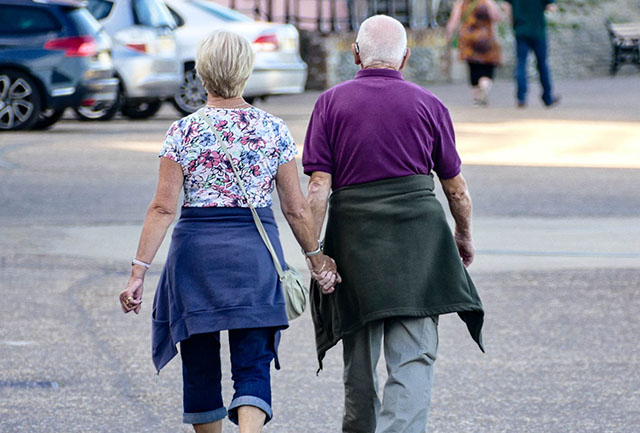
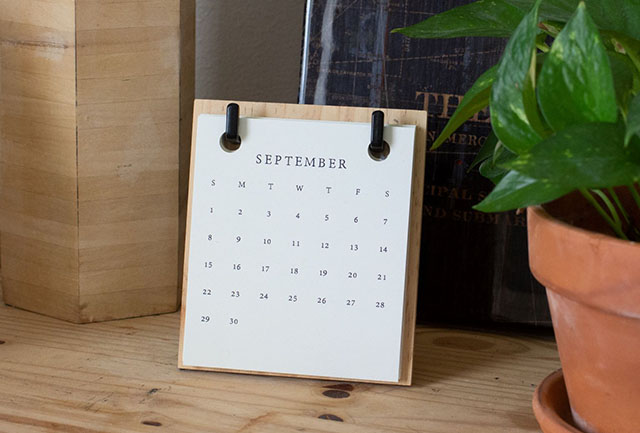
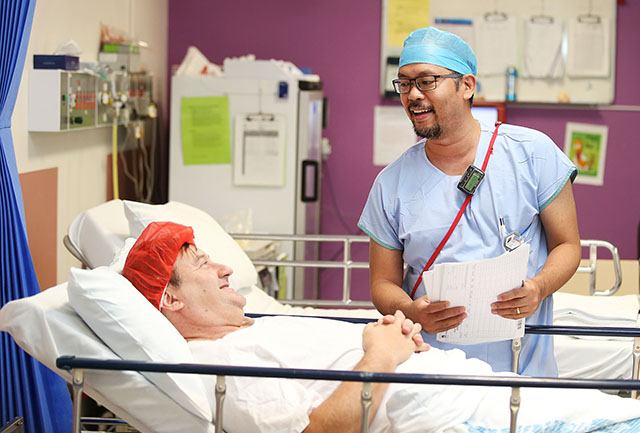
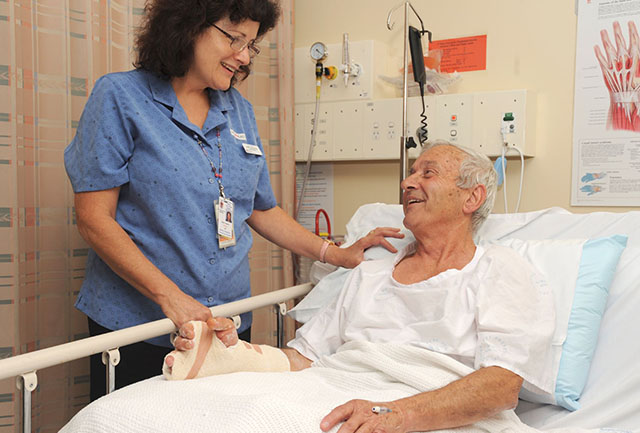

Surgery, Anaesthesia and Perioperative Medicine
This information is for you and your family if you are coming to our hospital for surgery. We want to help you feel confident about your surgery.
At Prince of Wales Hospital we perform these types of surgery:
- Cardiothoracic – heart and lung surgery
- Ophthalmology – eye surgery
- Orthopaedics – bone and joint surgery
- Plastic Surgery – repair or reconstruct skin or other body tissue
- Neurosurgery – nerve, spinal cord or brain surgery
- Vascular surgery – surgery on arteries or veins
- Urology – surgery on the urinary system including bladder and kidneys
- General surgery including: upper gastrointestinal tract, colorectal, oncology surgery
- Dental, oral and maxillofacial - teeth, jaw and face surgery
- Ear, nose and throat surgery.
The information below will help you plan and prepare for your surgery. We provide information on what to expect before, during and after your surgery.
How we can help you
Perioperative Unit
Phone:
02 9382 3847
Anaesthetic Pre Evaluation Clinic
Phone:
02 9382 3865






Surgery, Anaesthesia and Perioperative Medicine
This information is for you and your family if you are coming to our hospital for surgery. We want to help you feel confident about your surgery.
At Prince of Wales Hospital we perform these types of surgery:
- Cardiothoracic – heart and lung surgery
- Ophthalmology – eye surgery
- Orthopaedics – bone and joint surgery
- Plastic Surgery – repair or reconstruct skin or other body tissue
- Neurosurgery – nerve, spinal cord or brain surgery
- Vascular surgery – surgery on arteries or veins
- Urology – surgery on the urinary system including bladder and kidneys
- General surgery including: upper gastrointestinal tract, colorectal, oncology surgery
- Dental, oral and maxillofacial - teeth, jaw and face surgery
- Ear, nose and throat surgery.
The information below will help you plan and prepare for your surgery. We provide information on what to expect before, during and after your surgery.
How we can help you
Perioperative Unit
Phone:
02 9382 3847
Anaesthetic Pre Evaluation Clinic
Phone:
02 9382 3865






Cardiac Rehabilitation
How we can help you
Our team will support you in your recovery and ongoing management of your heart condition. We will work with you to assess your individual needs and provide you with a program that includes exercise, education and support you to make lifestyle changes to improve your heart health and overall well-being. The World Health Organization recommends that everyone with a heart related condition should attend cardiac rehabilitation.
Mobile
0408 183 189
Manager
Jackie Favretti, Clinical Nurse Consultant and Fiona Cotter, Clinical Nurse Consultant
Exercise Coordinator
Katie Holgate, Senior Cardiothoracic Physiotherapist
How to find us
Physiotherapy, Level 1, High St building (Building 2 on our campus map)
Information about how to get to our Randwick campus
Our service is for anyone who has a heart condition such as:
- Heart Attack
- Angina
- Coronary Artery Disease
- CABG
- Stent or Angioplasty
- Heart Failure
- Atrial Fibrillation
- Pacemaker or ICD Implant
- Valve Disease or Valve Surgery
The cardiac rehabilitation team includes cardiac nurses, physiotherapists and other health professionals.
Initial Assessment:
Before you start the program, you will have an individualised assessment with one of our cardiac nurses to support and improve your recovery.
Exercise Sessions:
You are invited to attend 12 group exercise sessions for 6 weeks (twice per week on Tuesday and Thursday morning). We offer both traditional exercise sessions and high intensity interval training (HIIT). Each session is approximately 1 hour.
Lifestyle Information Sessions:
These sessions cover a variety of heart health topics led by our Allied Health team. These sessions are available in person or online.
Call 02 9369 0400 to register for Cardiac Rehabilitation at Prince of Wales Hospital. We will then contact you to schedule an initial assessment. You can also phone our office directly on 02 9382 2286 for more information.
What to bring to your appointment
- A list of your current medicines.
- The discharge letter from the hospital and/or your cardiologist.
Please let us know if you need an interpreter. You can contact us telephoning the Translating and Interpreting Service (TIS) National on 131 450. Tell the operator what language you speak and then ask the interpreter to set up a telephone conversation between you, an interpreter, and the healthcare professional you want to speak with.
- Visit the Heart Foundation Website: https://www.heartfoundation.org.au
- MyHeart MyLife is the Heart Foundation’s free support program for people living with heart disease www.myheartmylife.org.au
Cardiac Rehabilitation
How we can help you
Our team will support you in your recovery and ongoing management of your heart condition. We will work with you to assess your individual needs and provide you with a program that includes exercise, education and support you to make lifestyle changes to improve your heart health and overall well-being. The World Health Organization recommends that everyone with a heart related condition should attend cardiac rehabilitation.
Mobile
0408 183 189
Manager
Jackie Favretti, Clinical Nurse Consultant and Fiona Cotter, Clinical Nurse Consultant
Exercise Coordinator
Katie Holgate, Senior Cardiothoracic Physiotherapist
How to find us
Physiotherapy, Level 1, High St building (Building 2 on our campus map)
Information about how to get to our Randwick campus
Our service is for anyone who has a heart condition such as:
- Heart Attack
- Angina
- Coronary Artery Disease
- CABG
- Stent or Angioplasty
- Heart Failure
- Atrial Fibrillation
- Pacemaker or ICD Implant
- Valve Disease or Valve Surgery
The cardiac rehabilitation team includes cardiac nurses, physiotherapists and other health professionals.
Initial Assessment:
Before you start the program, you will have an individualised assessment with one of our cardiac nurses to support and improve your recovery.
Exercise Sessions:
You are invited to attend 12 group exercise sessions for 6 weeks (twice per week on Tuesday and Thursday morning). We offer both traditional exercise sessions and high intensity interval training (HIIT). Each session is approximately 1 hour.
Lifestyle Information Sessions:
These sessions cover a variety of heart health topics led by our Allied Health team. These sessions are available in person or online.
Call 02 9369 0400 to register for Cardiac Rehabilitation at Prince of Wales Hospital. We will then contact you to schedule an initial assessment. You can also phone our office directly on 02 9382 2286 for more information.
What to bring to your appointment
- A list of your current medicines.
- The discharge letter from the hospital and/or your cardiologist.
Please let us know if you need an interpreter. You can contact us telephoning the Translating and Interpreting Service (TIS) National on 131 450. Tell the operator what language you speak and then ask the interpreter to set up a telephone conversation between you, an interpreter, and the healthcare professional you want to speak with.
- Visit the Heart Foundation Website: https://www.heartfoundation.org.au
- MyHeart MyLife is the Heart Foundation’s free support program for people living with heart disease www.myheartmylife.org.au
Cardiology Services - Inpatient Wards and Echo Lab
How we can help you
We care for patients with heart disease, heart rhythm issues, heart failure and other heart problems. We can help by diagnosing your heart problem and providing medical and surgical treatment.
Surgical treatment includes open heart surgery such as bypass or valve surgery. Medical treatment includes management of heart attacks, cardiac arrest, heart rhythm problems and heart failure.
We also undertake procedures to diagnose and treat cardiac disease, such as:
- Ultrasound (echo)
- Stress tests
- Angiograms
- Stents
- Pacemakers
- Cardioversion
Our service areas are all on Level 3 of the Dickinson Building and include:
|
Our service areas |
Contact number |
|
Coronary Care Unit - This is a 9 bed unit where critically unwell patients are provided a high level of care and continually monitored. The unit is supported by specialist nurses, cardiologists in training and cardiologists. |
9382 0200 |
|
Acute Cardiology Ward (Dickinson 3 North) - This ward has 26 monitored beds and looks after patients who are more stable than those in the Coronary Care Unit. |
9382 0220 |
|
Echo Lab - This lab provides exercise stress tests, cardiac ultrasound (echo) including transoesophageal echo and cardioversion. |
9382 0740 |
We also partner with Eastern Heart Clinic, a private clinic located on the same level. They assist with diagnosis and treatment using:
- Angiogram
- Angioplasty and stent
- Pacemaker and implantable defibrillator insertion
- Pacemaker lead extraction
- Valve procedures including valvuloplasty and TAVI.
How to find us
Level 3, Dickinson Building, Prince of Wales Hospital (Building 15 on our campus map)
We are a specialised team of cardiologists, cardiothoracic surgeons, cardiothoracic anaesthetists, intensive care specialists, nurses and allied health professionals.
The majority of our patients are admitted as emergencies, although some are booked admissions for investigations or procedures. Usually patients stay 3-5 days however some patients may require only a short admission and others may require longer stays.
You may find being admitted to a cardiac unit quite frightening and stressful, however, our staff are here to support you and your family as you recover.
Once admitted to hospital you will probably have a number of tests to determine how well your heart is working. You may be asked to fast (not eat) before these.
A significant number of our patients come from areas outside of Sydney. We have a social worker who can assist with transport and accommodation if required.
In general, 3-5 days however some patients may require only a short admission and others may require longer stays.
In most cases, you will need to see a heart specialist after leaving our hospital. If you live in the local area, we will give you an appointment to see the specialist you saw at our hospital. If you live outside our local area, or already have your own cardiologist we suggest you make your own appointment. You will need a referral from your GP to see a specialist. We recommend that you contact the specialist’s rooms before your appointment to ask how much the appointment will cost. Some of the cost will be refundable from Medicare.
Please let us know if you need an interpreter. You can contact us telephoning the Translating and Interpreting Service (TIS) on 131 450. Tell the operator what language you speak and then ask the interpreter to set up a telephone conversation between you, an interpreter, and the healthcare professional you want to speak with.
My heart, my life app (Heart Foundation)
Cardiology Services - Inpatient Wards and Echo Lab
How we can help you
We care for patients with heart disease, heart rhythm issues, heart failure and other heart problems. We can help by diagnosing your heart problem and providing medical and surgical treatment.
Surgical treatment includes open heart surgery such as bypass or valve surgery. Medical treatment includes management of heart attacks, cardiac arrest, heart rhythm problems and heart failure.
We also undertake procedures to diagnose and treat cardiac disease, such as:
- Ultrasound (echo)
- Stress tests
- Angiograms
- Stents
- Pacemakers
- Cardioversion
Our service areas are all on Level 3 of the Dickinson Building and include:
|
Our service areas |
Contact number |
|
Coronary Care Unit - This is a 9 bed unit where critically unwell patients are provided a high level of care and continually monitored. The unit is supported by specialist nurses, cardiologists in training and cardiologists. |
9382 0200 |
|
Acute Cardiology Ward (Dickinson 3 North) - This ward has 26 monitored beds and looks after patients who are more stable than those in the Coronary Care Unit. |
9382 0220 |
|
Echo Lab - This lab provides exercise stress tests, cardiac ultrasound (echo) including transoesophageal echo and cardioversion. |
9382 0740 |
We also partner with Eastern Heart Clinic, a private clinic located on the same level. They assist with diagnosis and treatment using:
- Angiogram
- Angioplasty and stent
- Pacemaker and implantable defibrillator insertion
- Pacemaker lead extraction
- Valve procedures including valvuloplasty and TAVI.
How to find us
Level 3, Dickinson Building, Prince of Wales Hospital (Building 15 on our campus map)
We are a specialised team of cardiologists, cardiothoracic surgeons, cardiothoracic anaesthetists, intensive care specialists, nurses and allied health professionals.
The majority of our patients are admitted as emergencies, although some are booked admissions for investigations or procedures. Usually patients stay 3-5 days however some patients may require only a short admission and others may require longer stays.
You may find being admitted to a cardiac unit quite frightening and stressful, however, our staff are here to support you and your family as you recover.
Once admitted to hospital you will probably have a number of tests to determine how well your heart is working. You may be asked to fast (not eat) before these.
A significant number of our patients come from areas outside of Sydney. We have a social worker who can assist with transport and accommodation if required.
In general, 3-5 days however some patients may require only a short admission and others may require longer stays.
In most cases, you will need to see a heart specialist after leaving our hospital. If you live in the local area, we will give you an appointment to see the specialist you saw at our hospital. If you live outside our local area, or already have your own cardiologist we suggest you make your own appointment. You will need a referral from your GP to see a specialist. We recommend that you contact the specialist’s rooms before your appointment to ask how much the appointment will cost. Some of the cost will be refundable from Medicare.
Please let us know if you need an interpreter. You can contact us telephoning the Translating and Interpreting Service (TIS) on 131 450. Tell the operator what language you speak and then ask the interpreter to set up a telephone conversation between you, an interpreter, and the healthcare professional you want to speak with.
My heart, my life app (Heart Foundation)
Cardiothoracic Surgery
How we can help you
We look after people with heart and lung disease who require emergency or planned elective surgery.
|
Coronary heart disease causes the blood vessels to become blocked from plaque which contains cholesterol and fibrous tissue. This reduces the blood supply to the heart, which can cause a heart attack. Heart valve disease may be present from birth or may occur later in life from infection eg. rheumatic fever, endocarditis, or wear and tear. You heart valves may become thickened and narrowed or my fail to close properly. Lung disease is any problem in the lungs that prevents them from working properly. For example, collapsed lung, chronic lung infections causing scar tissue, lung cancer. |
Our team will look after you before, during and after your cardiothoracic surgery.
Our service includes:
- Cardiothoracic operating theatres
- Cardiac anaesthesia
- A four bed cardiothoracic intensive care unit
- 18 bed cardiothoracic ward.
Contact Details
Ward Phone: 9382 0263
Manager: Kara Jones
Cardiothoracic ICU Phone: 9382 0471
Manager: Lisa Jericevic
How to find us
Our cardiac services are on Level 3, Barker Street (Dickinson Building), Prince of Wales Hospital (building 15 on our campus map)
Information about how to get to our Randwick campus
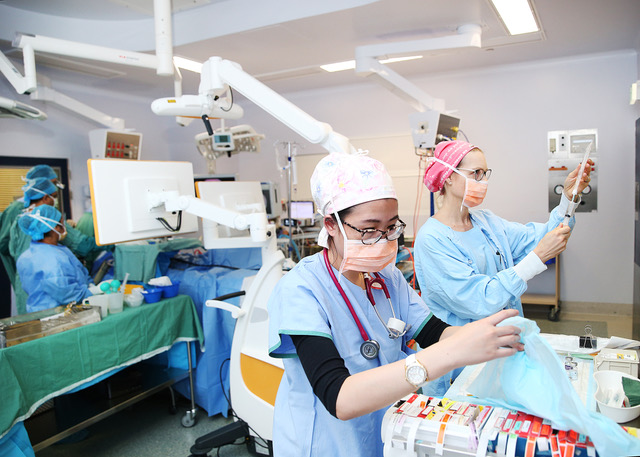
The heart surgeries we perform include:
Coronary artery bypass surgery (CABG): This surgery involves the use of blood vessels to bypass blockages in the coronary arteries.
Heart valve surgery: There are four valves in the heart. A surgeon may be able to repair a diseased valve or may have to replace it, using either a tissue valve (made from the heart tissue of a pig or cow) or a mechanical valve.
Atrial and ventricular septal defects: An atrial septal defect is an opening in the wall of the heart which divides the upper chambers of the heart. A ventricular septal defect is an opening in the wall of the heart between the lower chambers of the heart. These defects may be closed using stitches or a synthetic patch.
Aneurysms: A weakness in the heart muscle from a heart attack may cause a bulge. This is corrected by reinforcing or patching the affected area.
Our cardiothoracic surgery team includes intensive care specialists, cardiothoracic surgeons, cardiothoracic anaesthetists, specialised nurses and allied health.
We work in partnership with the broader Prince of Wales Hospital cardiac services which include the cardiology ward and coronary care unit. We also are closely integrated with the Intensive Care Unit and Eastern Heart Clinic.
You will need a referral from your local general practitioner (GP) and a surgeon to use our services. If you need surgery, you will be placed on a waiting list after being seen by your cardiothoracic surgeon.
You will receive an email or letter from our Admissions Department with details on what type of surgery you need, the date and when to telephone the hospital. If there are any changes to your surgery date, the hospital will contact you.
The letter may ask you to attend a pre-admission clinic. At pre-admission clinic you may be seen by either a nurse, anaesthetist or the surgical team who may take tests, advise you on how to prepare for your surgery or discuss your care when you leave hospital.
If your surgery is planned and is in the public hospital system, you will be placed on a waiting list. Your surgeon will decide how serious your condition is and how quickly you will need to have your surgery. Sometimes it is necessary to delay surgery that has been booked to make way for life-threatening cases which are admitted through our emergency department.
If you have questions about waiting times you can call the Surgery Access Line.
If you are having cardiothoracic surgery at Prince of Wales Hospital we like to make sure there is a bed available in our Cardiothoracic Intensive Care Unit. Sometimes you may come into hospital for your surgery and an emergency occurs and there is no longer an intensive care bed available. Should this happen we will need to rebook your surgery.
If you are well enough and your surgeon recommends it, you will be asked to attend the pre-admission clinic to prepare for your surgery. This is done the week or even the day before your surgery.
There are a number of tests that need to be completed prior to your surgery, and these need to be organised by your local general practitioner (GP) and brought with you to the pre-admission clinic. These include a chest X-ray, and blood tests. Please wait until we have talked to you before having these done.
Before your cardiothoracic surgery it is important to be as fit as you can be. If you have diabetes we encourage you to see your GP and Endocrinologist to ensure your blood sugar levels are stable at the time of your surgery.
It is important to stop smoking before having surgery. Smoking drastically increases the risk of complications. Your GP can help you with this. Your local chemist can help you with nicotine replacement therapy or you can call the national Quit line on 131 848. You can also get support from the Smoking Clinic in the Department of Respiratory Medicine at Prince of Wales Hospital on phone number 9382 4641.
Before you have surgery it is important to organise for a responsible adult to take you home from hospital and to stay with you for two weeks after you return home. You will need to rest, so plan and arrange leave from work and for help with cooking, shopping, laundry and cleaning.
For more information on what to expect you can read these brochures
Or watch this video - Heart Surgery at POWH
You will need to bring to hospital:
- Your referral from your GP and your referral from your Surgeon
- Medicare card
- Health care card and/or concession card (if you have one)
- Previous X-rays, scans, ultrasounds or any other test results
- Your regular medicines and a list of all that you are currently taking (or the boxes), including those you take without a prescription such as herbal supplements or vitamins
- Glasses, hearing aid, walking frame.
- For an overnight stay please bring: your sleepwear, dressing gown, slippers, personal hygiene items (e.g. shampoo, shaver, toothbrush and paste) and something to read or an iPad or tablet with headphones.
Please do not bring:
Your handbag, wallet, purse, or large amounts of cash. Valuables including jewellery and watches.
Please let us know if you need an interpreter. You can contact us telephoning the Translating and Interpreting Service (TIS) on 131 450. Tell the operator what language you speak and then ask the interpreter to set up a telephone conversation between you, an interpreter, and the healthcare professional you want to speak with.